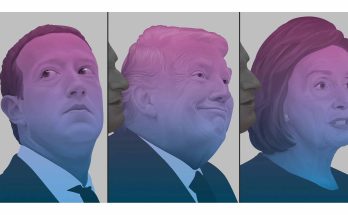Inside Mark Zuckerberg’s Lost Notebook
WIRED, February 12, 2020
Business
By Steven Levy
“In the early days of Facebook, Zuck kept his plans for world domination in handwritten journals. He destroyed them. But a few revealing pages survived.”
I first met Mark Zuckerberg in March 2006. At the time, I was the lead tech writer at Newsweek and was working on a story about what we were calling Web 2.0—the notion that the next stage of the internet would be a joyful, participatory creation of individuals. I’d heard about a social networking startup that was spreading like kudzu on college campuses. I wanted to learn more about it, perhaps give it a name-check in the story. Luckily, Zuckerberg, its cofounder and CEO, was scheduled to appear that month at PC Forum, a conference I regularly attended, at a resort in Carlsbad, California.
We agreed to meet at the lunch hour on the conference grounds. We sat side by side at one of the big, crowded, round tables set up on a lawn under the bright sun. He was accompanied by Matt Cohler, who had left LinkedIn to join Facebook. Cohler, unable to nab a seat next to us, sat across the table, barely within ear range.
I took it in stride that Zuckerberg looked even younger than his 21 years. I’d been covering hackers and tech companies for long enough to have met other peach-fuzz magnates. But what did shake me was his affect. I asked him a few softball questions about what the company was up to, and he just stared at me. He said nothing. He didn’t seem angry or preoccupied. Just blank. If my questions had been shot from a water pistol at the rock face of a high cliff they would have had more impact.
I was flummoxed. This guy is the CEO, isn’t he? Is he having some sort of episode? Was there something I’d written that made him hate me? Time seemed to freeze as the silence continued.
I looked over to Cohler for guidance. He smiled pleasantly. No lifeline.
Stumbling for a way out of the awkwardness, I asked Zuckerberg if he knew anything about PC Forum. He said no, and so, as a resident Methuselah, I explained its roots as the key industry gathering in the personal computer era, where Bill Gates and Steve Jobs would go at each other with smiles on their faces and shivs in their fists. After taking in that bit of lore, he seemed to thaw, and for the rest of the lunch he was able to talk, albeit sketchily, about the company he started in a dorm room and which had grown to 7 million users.
Though I was unaware at the time, I had joined the club of those stunned by Mark Zuckerberg’s trancelike silences. Facebook VP Andrew Bosworth once called this stare “Sauron’s gaze.”
Zuckerberg and Facebook got four sentences in my cover story, “The New Wisdom of the Web.” If I’d known the things that Zuckerberg hadn’t shared with me that afternoon at the La Costa Resort and Spa, I might have devoted more space.
Zuckerberg was entering one of the most productive periods in his life. A few weeks after I met him, he would lay out a ludicrously ambitious vision for Facebook. In a journal with unlined 8-by-10 paper, he sketched his mission and product design and explored how a tiny company might become a vital utility for the world. In detail, he described features called Open Registration and Feed, two products that would supercharge his company.
Zuckerberg found focus in that notebook and others. In his jottings are the seeds of what would come—all the greatness and the failings of Facebook. Over the next 10 years, Zuckerberg would execute the plans he drew up there. Facebook would transform itself from a college student hangout to the dominant social media service, with a population bigger than that of any country in the world, and was on its way to having more members than any religion. Zuckerberg’s gospel insisted that more and more sharing was an inherent good. In addition to bringing people together, Facebook became a source of news, entertainment, and even life-saving information. The company monetized its user base with ads, and Zuckerberg became one of the richest people in the world, his name hoisted into the pantheon of PC Forum legends.
And then came the 2016 election. Suddenly, simmering complaints about the service boiled over into anger. Facebook’s most cherished accomplishments became liabilities. The enormous numbers of people who connected, “We Are the World”-style, on the service now became alarming evidence of its excessive power. A platform that allowed the voiceless to be heard also allowed trolls to broadcast bilious provocation at ear-splitting decibel levels. It was a tool for deadly oppressors and liberation movements alike. And above all, it was an egregious privacy offender: Facebook’s long-held ethic of sharing was now viewed as a honey trap to snare user data. And that data—information provided wittingly and unwittingly by all of us—was the substance on which Facebook grew fat and prospered.
Since 2006 I’ve been watching Zuckerberg and, over the past three years, have been writing a history of his company. I’ve spoken to him nine times and observed as he’s adapted—and, in some ways, refused to adapt—to the most challenging circumstances. The shift in public attitudes toward Facebook mirrors the reputational fall of the tech sector itself. But Facebook’s unique circumstances emanate largely from its founder’s personality, vision, and approach to management. To understand Facebook, you have to understand Zuckerberg.
That isn’t the easiest task. Even he admits that there’s a robotic coolness to his public persona. After many conversations, he got relatively candid with me, but there was always a measure of reserve. He never forgot that I’m a reporter and was understandably protective of himself and the company he built.
But I did find one venue where Zuckerberg was utterly frank and unfiltered about his plans and dreams for Facebook, providing vital clues about the man running the world’s most powerful companies. It was in the notebook he kept in the spring of 2006.
About the Author:
STEVEN LEVY is WIRED’s editor at large. He wrote about Jeff Bezos and Blue Origin in issue 26.11.
Adapted from Facebook: the Inside Story, by Steven Levy, to be published February 25, 2020, by Blue Rider Press, an imprint of Penguin Publishing Group, a division of Penguin Random House LLC. Copyright ©2020 by Steven Levy






